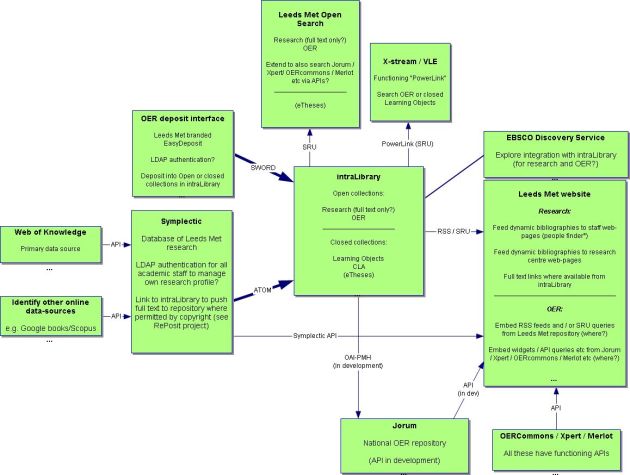As mentioned in this recent post I’ve been experimenting with WordPress for presenting OER and have been testing a pre-release version of a WordPress plug-in, developed by the Triton project at the University of Oxford to facilitate a dynamic collection of OER in a WordPress blog.
Developer @patlockley describes the overall functionality of the plug-in here and also covers some of the limitations posed by the broader OER infrastructure here emphasising that “no standard API exists across repositories so as to facilitate a single approach to aggregation for an aggregation creator” – as well as a seperate post here considering limitations of the WordPress platform itself used in this context and associated technical considerations.
In summary the plug-in searches Xpert, Merlot and OER Commons (via their API) as well as Wikipedia, Wikibooks and Wikiversity for openly licensed material; Mendeley for journals and with options to add RSS feeds for blogs and podcasts.
Here I’ll briefly describe my experiences of using the plug-in – fairly candid in the hope that it will be useful feedback to Pat and Triton albeit with the initial caveat that any issues I’ve encountered are just as likely to be associated with my limited experience of WordPress and my shambrarian status (I simply haven’t had time to hone the search terms as carefully as I would like) as with the plug-in itself (which of course is pre-release.)
Once installed, famously straightforward in WordPress even prior to release (via FTP), you get a new “Dynamic Collection” tab in the dashboard where I can add a new collection…pretty much at random, I chose an undergraduate course from Leeds Met – Civil Engineering – around which to build my dynamic collection – it’s then just a matter of adding title and search terms, updating the feeds from the three source repositories and publishing:
 This admittedly unsophisticated search returned 9 results:
This admittedly unsophisticated search returned 9 results:

Obviously the plug-in is only as effective as the keyword data / api / source repository(ies) that it is using and the fifth link here actually points at an entirely different resource (in Jorum) with no relevance to Civil Engineering, presumably due to an error at some point along it’s, er, conjugation – as the plug-in does not search Jorum directly this must have come via Xpert which does harvest Jorum. While experimenting with the plug-in I’ve also had instances where links have returned 404s or been otherwise broken so one requirement I think would be the option to remove links from the collection that are incorrect, broken…or simply less relevant; to allow the WordPress administrator fuller control of the collection.
In order to add a blog or podcast under the Settings tab, the plug-in has installed several new tabs (I don’t think the Feed management / Collection statistics / Collection tabs are yet fully functional in the version I am testing):

Under the Dynamic Collection Options there are fields to add rss feeds from blogs or podcasts:

I’ve experienced a few teething troubles adding blogs not least because I don’t know much about Civil Engineering! As I understand, it should search blog title and description for the dynamic collection keywords…I added a feed from http://www.civilengineering.co.uk/feed/ which returned this single (most recent) post – http://www.civilengineering.co.uk/2010/09/civil-engineering-issues/ (the blog, in fact, only appears to comprise 2 posts so presumably would update should any new posts be added?)
I’m very optimistic about the potential of this approach to allow WordPressing course leaders, perhaps with support from learning technologists, to quickly and easily assemble a dynamic collection of OER for their students and look forward to the formal release of the finished product* – in the meantime, in true Blue Peter stylee, here are a number of collections that Pat made earlier to give a sense of what should be possible:
http://politicsinspires.org/dynamic_collection/political-theory/
http://politicsinspires.org/dynamic_collection/comparative-government/
http://politicsinspires.org/dynamic_collection/international-relations/
http://politicsinspires.org/dynamic_collection/european-politics-and-society/
* The only caveat from my perspective is that my own institution does not formally support the use of WordPress, nevertheless, there is certainly a requirement, explicitly identified by senior stakeholders, to develop tools to cross-search Open Educational Resources and, in this context, I think we can learn a lot from the Triton project.
N.B. Such a mechanism, however implemented via the proliferation of OER repositories and their APIs, also put me in mind of this post from Suzanne Hardy (@glittrgirl) of MEDEV and the PORSCHE project – Branding, repositories, OER and awareness raising: some thoughts on embedding OERs
See also: Delores OER – WordPress for hosting and describing learning resources (University of Bath and Heriot-Watt)






